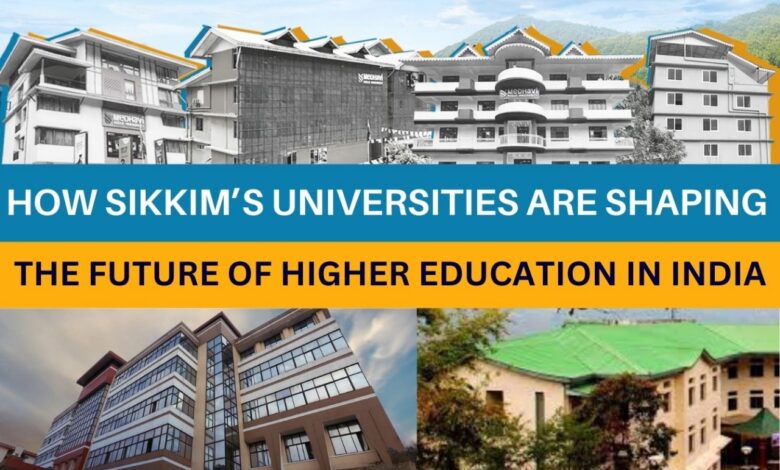How Sikkim’s Universities Are Shaping the Future of Higher Education in India

By Ishita Naskar
Sikkim, one of the most beautiful states in the foothills of the Himalayas is quickly becoming one of India’s centers of intellectual brilliance. With their emphasis on high-quality education, hands-on learning and international exposure, universities in Sikkim are significantly influencing the direction of higher education in the nation. Sikkim, even though one of the smallest states in India, its emphasis on higher education is creating waves in academic circles and making it a popular destination for both students and academicians.
A Rising Educational Powerhouse
Sikkim’s higher education system has changed simultaneously over the last ten years. By partnering with international organizations and providing specialized programs, Sikkim’s universities are reinventing themselves in what it means to be a leader in higher education. By its deliberate emphasis on inclusiveness, industry alignment, and skills-based education, students from all around India and beyond have been drawn to the state.
Because of the government’s efforts to advance education and the work of private universities Sikkim is now a shining example of educational reforms. In order to satisfy the needs of the modern workforce, these schools place a strong emphasis on cutting edge facilities, creative teaching strategies and curriculum.
Key Drivers of Change in Higher Education in Sikkim
Industry-Integrated Learning
One of the most notable aspects of Sikkim is its industry-integrated approach to higher education. These universities understand how crucial it is to bridge the gap between academic knowledge and real world application. These programs are designed to meet the needs of the industry assuring that graduates are well prepared for the workforce. Well represented industries like healthcare, technology, tourism and hospitality particularly reflects the state’s economic interests.
For instance by offering special courses in tourism administration, Sikkim’s universities leverage the state’s natural beauty and booming tourism. Similarly, in both home and foreign markets, healthcare initiatives aim to meet the rising need for qualified workers.
Focus on Skill Development
In accordance with India’s Skill India initiative, higher education institutions in Sikkim have a strong commitment to skill development. Practical internships, real life projects and vocational training are a major component of this curriculum. In addition to theoretical knowledge this emphasis guarantees that students have the skills necessary to succeed in their chosen fields.
In order to let students receive credit for previous education and employment experiences, a lot of colleges have adopted credit-based programs. This adaptable method increases the accessibility and significance of higher education for a variety of learner groups.
Global Collaborations
The globalization of Sikkim’s universities is progressing. Thanks to the partnerships with international academic institutions, students can take part in exchange programs, foreign internships and cooperative research projects. These programs help students expand their perspectives and get ready for jobs in a globalized society.
Additionally, faculty members from around the world are drawn to the state’s colleges creating a multicultural environment that enhances the quality of education.
Research and Sustainability
Because of its pristine environment and abundant biodiversity, Sikkim has emerged as a center for sustainability, environmental science and renewable energy. This state’s institutions encourage staff and students to work on research projects that address urgent global issues. Thus, Sikkim is established as a pioneer in sustainable education in addition to enhancing the educational process.
Accessibility and Inclusivity
Students from a range of socio-economic backgrounds are served in Sikkim because of their inclusive higher education approach. Thanks to special scholarships, financial support initiatives and flexible admission policies everyone has access to high quality education. The state further solidifies its dedication to inclusive growth by emphasizing on empowering underrepresented communities and promoting gender equality.
Leading Universities in Sikkim
Sikkim is home to a number of prestigious universities in India that are leading the way in higher education. Universities like Medhavi Skills University, Sikkim University, and Sikkim Manipal University are leading the movement with their cutting edge curriculum and student centred strategies.
Sikkim Manipal University (SMU)
SMU provides a variety of degrees that are both academically demanding and relevant to the market and this university is also well known for emphasizing technology and healthcare education. Because of the university’s collaboration with top organizations, students are exposed to real-world issues in a way that is unmatched.
Sikkim University
Sikkim University is a central institution that places a strong emphasis on interdisciplinary education and research. Because this university’s courses represent the ecological and cultural richness of the area, its social science, linguistics and environmental science disciplines stand out.
Medhavi Skills University (MSU)
The reason why MSU stands out is because of its dedication to skill based education. With programs that combine academic study, professional experience and prior learning MSU equips students to succeed in today’s competitive job market. MSU’s emphasis on skill development, on job training, hands on learning, outcome based education and credit based learning systems perfectly captures the spirit of innovation in Sikkim’s higher education.
The rise of higher education in Sikkim is the evidence of the strength of teamwork and vision. As more educators and students learn about the opportunities this Himalayan state has to offer, Sikkim will undoubtedly have a greater impact on India’s academic scene. With its progressive approach, in addition to influencing the future of its students, Sikkim is reshaping the future of higher education in India.





